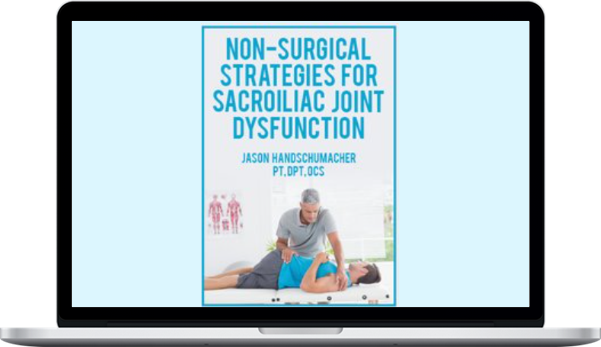Jason Handschumacher – Non-Surgical Strategies for Sacroiliac Joint Dysfunction
$59.99 $13.00
Total Sold: 1
»Instant Delivery
Description
Jason Handschumacher – Non-Surgical Strategies for Sacroiliac Joint Dysfunction
Description of Non-Surgical Strategies for Sacroiliac Joint Dysfunction
The sacroiliac joint as a source of pain has traditionally been controversial. As knowledge about the structure and functions of the joint has advanced, this has changed. It is now reported in literature that the SIJ is the origin of pain in as many as 30% of people presenting with complaints of LBP. Clinically the SIJ can be challenging to evaluate. Assessing pain location and pattern, patient posture and movements, and clusters of manual provocation tests can clarify a working diagnosis of SIJ dysfunction.
This recording aims to simplify the vast array of options available to clinicians. We will demonstrate the most effective examinations and application of current evidence-based treatment to guide efficient and effective improvements for our patients, clients, and athletes. Through case study and video demonstration, you will walk away with a simple and efficient way to evaluate this region and help improve everyday function for what can be an elusive condition.
Objectives
- Correlate relevant anatomical structures and stability concepts
- Evaluation the current literature regarding sacroiliac clinical findings, joint mobilization, non-surgical stabilization options and exercise
- Simulate effective manual therapy and therapeutic exercise interventions
Outline
- Key Points of Anatomy
- Stability Concepts
- Examination Goals
- Primary Interventions
- Evaluating Progress
- Next Steps
More courses from the same author: Jason Handschumacher
Delivery Policy
When will I receive my course?
You will receive a link to download your course immediately or within 1 to 21 days. It depends on the product you buy, so please read the short description of the product carefully before making a purchase.
How is my course delivered?
We share courses through Google Drive, so once your order is complete, you'll receive an invitation to view the course in your email.
To avoid any delay in delivery, please provide a Google mail and enter your email address correctly in the Checkout Page.
In case you submit a wrong email address, please contact us to resend the course to the correct email.
How do I check status of my order?
Please log in to HealingCourse account then go to Order Page. You will find all your orders includes number, date, status and total price.
If the status is Processing: Your course is being uploaded. Please be patient and wait for us to complete your order. If your order has multiple courses and one of them has not been updated with the download link, the status of the order is also Processing.
If the status is Completed: Your course is ready for immediate download. Click "VIEW" to view details and download the course.
Where can I find my course?
Once your order is complete, a link to download the course will automatically be sent to your email.
You can also get the download link by logging into your HealingCourse account then going to Downloads Page.










